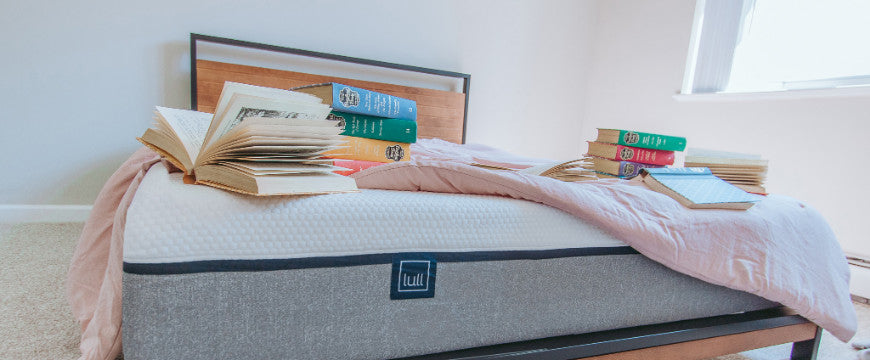- Your mom has been telling you since day one: make a schedule for yourself! Organize your day and allot time for studying and socializing, leaving a sufficient amount of time for proper sleep. Consciously following a schedule can help keep you on track with your day so that you don’t eat into your precious sleep time.
- Your bed is made for sleeping, and that’s only what it should be. Try to avoid studying in bed, keep the space strictly for relaxation and sleep. Your bed should be your safe haven from stress, and should only be associated with sleep. If you associate your bed with studying or work, when going to sleep your mind will continue working, making it harder to rest.
- Strive for ultimate comfort. Treat your bed like a sanctuary, and ensure you have a proper mattress and bedding that’ll provide the best quality of sleep. Finding the perfect mattress has never been more simple: you’ll find going to bed to be much more enjoyable, and getting to sleep that much easier!

What Every Student Should Know Before Going Back to School
It’s the last day of summer. You slowly roll out of bed after a night’s sleep that lasted a blissful 12 hours. Looking at your phone you then realize: “Oh my god, school starts tomorrow.” Pulling the covers back over your head, you sit in silence, dreading the serious lack of sleep you will soon endure.
It’s no secret that for the average college student getting enough sleep is an idea that seems entirely ludicrous. Given the strenuous daily work load, consistent late nights and the far too frequent all-nighters are now accepted norms amongst the majority of full-time students.
According to the Journal of Adolescent Health, as much as 70-96% of college students receive less than 8 hours of sleep a night on any given week day.
So as the transition from careless summer days to stressing over course-work quickly approaches, here’s what you should know about how sleep deprivation can affect your studies and daily life this coming school year:
Brain Functionality and Memory
For years studies have found that inadequate sleep can have serious effects on various brain functionalities. Poor sleeping habits can lead to inability or difficulty concentrating, slowed-reaction time, and can impair memory. Research has shown that sleep is required in proper memory consolidation, and any lost sleep from “all-nighters” cannot be made up for. Without enough sleep your brain will fail to retain important information, including all of the notes you spent hours taking. Skip the all-nighter, your brain will thank you.
Mental and Physical Health
Not only can insufficient sleep affect general brain functions, but it can also take a toll on both your mental and physical health. According to the National Alliance on Mental Illness, among sleep-deprived students 44% struggle with symptoms of depression, while 50% experience anxiety. With this, losing sleep can increase the risk of obesity, diabetes, compromised immune system and other forms of disease.
Grade Point Average
This is what it’s all about. Every insane study-decision a student makes, compromising their sleep and health, all comes down to this number. But what’s ironic is that poor sleeping habits have been shown to in fact have an inverse reaction on a student’s GPA. With poor sleep comes the detrimental effects it has on your brain, which may consequently lead to a GPA drop. Don’t allow both your well-being and the GPA you worked so hard for to slip away.
Quick and easy steps to get yourself back on track!
There are a multitude of solutions and tips you can follow to better your sleep habits as a student, but here a few quick tips to remember: